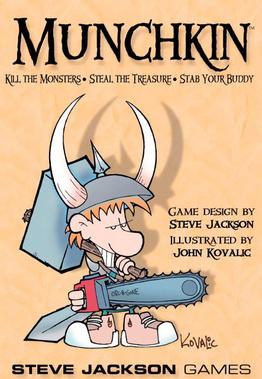
Steve Jackson Games (SJGames) is a game company, founded in 1980 by Steve Jackson, that creates and publishes role-playing, board, and card games, and the gaming magazine Pyramid.
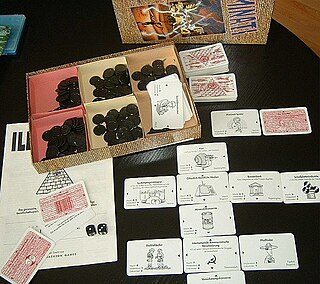
Illuminati is a card game made by Steve Jackson Games (SJG), inspired by the 1975 book The Illuminatus! Trilogy, by Robert Anton Wilson and Robert Shea. The game has ominous secret societies competing with each other to control the world through various means, including legal, illegal, and even mystical. It was designed as a "tongue-in-cheek rather than serious" take on conspiracy theories. It contains groups named similarly to real-world organizations, such as the Society for Creative Anachronism and the Symbionese Liberation Army. It can be played by two to eight players. Depending on the number of players, a game can take between one and six hours.

Cosmic Encounter is a science fiction–themed strategy board game designed by "Future Pastimes" and originally published by Eon Games in 1977. In it, each player takes the role of a particular alien species, each with a unique power to bend or break one of the rules of the game, trying to establish control over the universe. The game was inducted into the Academy of Adventure Gaming Arts & Design Adventure Gaming Hall of Fame in 1997.

HeroQuest, is an adventure board game created by Milton Bradley in conjunction with the British company Games Workshop in 1989, and re-released in 2021. The game is loosely based around archetypes of fantasy role-playing games: the game itself was actually a game system, allowing the gamemaster to create dungeons of their own design using the provided game board, tiles, furnishings and figures. The game manual describes Morcar/Zargon as a former apprentice of Mentor, and the parchment text is read aloud from Mentor's perspective. Several expansions have been released, each adding new tiles, traps, artifacts, and monsters to the core system.
Chrononauts is a family of card games that simulates popular fictional ideas about how time travellers might alter history, drawing on sources like Back to the Future and the short stories collection Travels Through Time. The game was designed by Andrew Looney and is published by Looney Labs. The original game and a variant each won the Origins Award for Best Traditional Card Game.
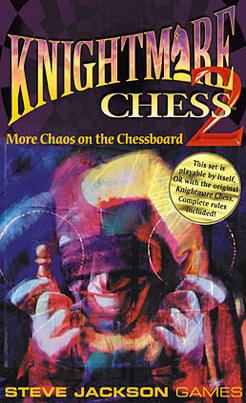
Knightmare Chess is a fantasy chess variant published by Steve Jackson Games (SJG) in 1996. It is a translation of a French game Tempête sur l'échiquier, designed by Pierre Cléquin and Bruno Faidutti. A stand-alone 80 card expansion called Series 2 was scheduled for a December 1997 release.

Steve Jackson is an American game designer whose creations include the role-playing game GURPS and the card game Munchkin.

Chez Geek is a card game that parodies geek culture and cohabitation. It was created by Jon Darbro and developed by Alain H. Dawson, with additional development by Steve Jackson and Russell Godwin. The cards and rules were illustrated by John Kovalic. Upon its release, the game won the Origins Award.
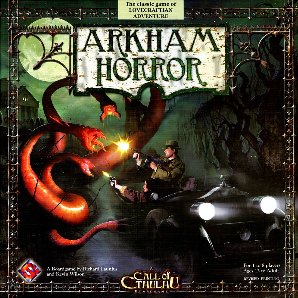
Arkham Horror is a cooperative adventure board game designed by Richard Launius, originally published in 1987 by Chaosium. The game is based on Chaosium's roleplaying game Call of Cthulhu, which is set in the Cthulhu mythos of H.P. Lovecraft and other horror writers. The game's second edition was released by Fantasy Flight Games in 2005, with a third edition in 2018.
Frag is a first-person shooter-themed board game published by Steve Jackson Games in the summer of 2001. It was developed by Steve Jackson and Philip Reed, and illustrated by Alex Fernandez.

Dungeon! is an adventure board game designed by David R. Megarry and first released by TSR, Inc. in 1975. Additional contributions through multiple editions were made by Gary Gygax, Steve Winter, Jeff Grubb, Chris Dupuis and Michael Gray. Dungeon! simulates some aspects of the Dungeons & Dragons (D&D) role-playing game, which was released in 1974, although Megarry had a prototype of Dungeon! ready as early as 1972.
Car Wars: The Card Game is a card game version of Steve Jackson Games' Car Wars miniatures game.
Sleeping Queens is a children's card game invented by Miranda Evarts and first manufactured by Gamewright in 2005. Players play cards to awaken sleeping queens and to steal or put to sleep the awakened queens of their opponents.
Diceland is a tabletop game played with collectible sets of dice designed by Toivo Rovainen and James Ernest and released in 2002 by Cheapass Games. Players roll paper cut-out octahedral dice into a combat arena. The dice are then used in the same way as miniatures - they can be moved around the arena and attack other dice.
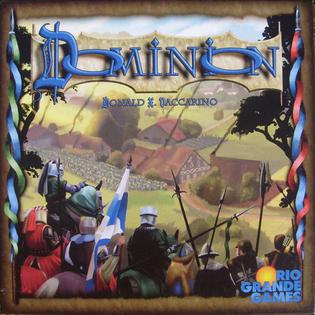
Dominion is a card game created by Donald X. Vaccarino and published by Rio Grande Games. Originally published in 2008, it was the first deck-building game, and inspired a genre of games building on its central mechanic. Each player begins with a small deck of cards, which they improve by purchasing cards from a common supply that varies from game to game. Each turn, players draw from their deck and use the cards drawn to purchase new cards or perform other actions. Once a player's draw pile is depleted, they reshuffle their discard pile back into their draw pile, thus allowing cards purchased on prior turns to be drawn and played on future turns. The player who has the most victory points by the end of the game wins.
Gloom is a tabletop card game created by designer Keith Baker and published by Atlas Games in 2004. It won the Origins Award for Best Traditional Card Game in 2005. Four expansion packs have been created since the release of the original game called, Unhappy Homes, Unwelcome Guests, Unquiet Dead and Unfortunate Expeditions. Additionally, In August 2011, Cthulhu Gloom, which serves as either a standalone game or a fifth expansion pack, was released, and one Cthulhu expansion pack has been released, called Unpleasant Dreams.
Conquest of Nerath is a Dungeons & Dragons themed war board game published by Wizards of the Coast in 2011.
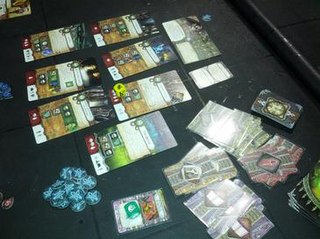
Elder Sign is a cooperative card and dice game, based on the Cthulhu Mythos of horror writer H.P. Lovecraft and Chaosium's Call of Cthulhu roleplaying game. It is published by Fantasy Flight Games, which also produces the Cthulhu Mythos games Arkham Horror, Call of Cthulhu: The Card Game, Mansions of Madness, and Eldritch Horror.
Castle Panic is a board game designed by Justin De Witt and published by Fireside Games in 2009 Castle Panic is a tower defense strategy game in which players work cooperatively to protect a castle from monsters. The game was a nominee for the 2010 Golden Geek Best Family Board Game.
Fireside Games is a US based board game publishing company owned and operated by Justin De Witt and Anne-Marie De Witt. Based in Austin, Texas, the company was founded in 2007. They published their first game, Castle Panic in 2009, and have published several expansions and sequels as well as other titles since then.
